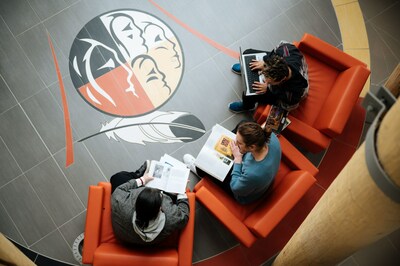UQAT to train all of its students in Indigenous perspectives by 2026
ROUYN-NORANDA, QC, Dec. 6, 2023 /CNW/ - In order to ensure that all our programs are culturally relevant, the Université du Québec en Abitibi-Témiscamingue (UQAT) has embarked on a major initiative to include Indigenous perspectives throughout its academic curriculum. As part of a decolonization and reconciliation approach, several programs and courses designed, evaluated and revised for, by and with First Peoples will be offered to the student population. This innovative initiative stems directly from the UQAT and Indigenous Peoples - Action Plan 2019-2024 and is one of several institutional actions of UQAT's Land acknowledgement principle. This wide-ranging operation is already underway and will be fully completed by 2026.
"Through this initiative, UQAT recognizes that Indigenous knowledge is just as important as scientific knowledge. This recognition gives Indigenous perspectives a place in the programs offered at UQAT, thereby building on a plurality of knowledge", says Vincent Rousson, UQAT Rector. This collaborative work, carried out by the Dean of Studies and the Mamawi Mikimodan Service, includes the improvement of templates, guides and other tools aimed at implementing a systemic process that promotes the inclusion of Indigenous perspectives in program development, evaluation and review.
The deployment of Indigenous knowledge in teaching and research is a response to the many calls to action issued by the various commissions of inquiry held in Canada and Quebec. Indeed, several calls to action aimed at the academic community, and others that relate more specifically to study programs offered at UQAT, such as health sciences, social work and education, can be found in the final reports of the Royal Commission on Aboriginal Peoples (RCAP), the Truth and Reconciliation Commission of Canada (TRC), the Inquiry Commission on relations between Indigenous Peoples and certain public services in Quebec (CERP) and the National Inquiry into Missing and Murdered Indigenous Women and Girls (MMIWG).
"As an academic institution, it is essential to fight against the lack of understanding of Indigenous realities. Our commitment to this endeavor is deep and unequivocal," explains Janet Mark, Strategic Advisor for Reconciliation and Indigenous Education for the Mamawi Mikimodan Service. "We have a responsibility to get involved, to bridge the gap and reduce the difference between Indigenous and non-Indigenous people in terms of education. Otherwise, the inequalities experienced by Indigenous peoples will persist. Our aim is not simply to adapt, but rather to change existing structures and practices," concludes Ms. Mark.
A number of initiatives aimed at training students have already been in place for several years at UQAT. In nine of the University's eleven departments, specific courses focusing on Indigenous contexts, whether mandatory or optional, are offered in certain programs, and others are currently being developed. This enhancement of the courses and programs we offer is in addition to the many research projects carried out in collaboration with Indigenous partners in various fields, as well as the many initiatives undertaken to promote Indigenous languages. The Mamawi Mikimodan Service and the School of Indigenous Studies, the only university department entirely dedicated to Indigenous Studies in Quebec, are among the UQAT actors playing a key role in this area.
For 40 years, UQAT has been an exceptional, community-based and committed university. With its three campuses, four centers and points of service in Abitibi-Témiscamingue, Nord-du-Québec, the Upper Laurentians and Montreal, UQAT has more than 7,000 students and offers over 180 study programs, including Indigenous studies. UQAT has always recognized the importance of its special partnership with Indigenous peoples, and sees it as an essential part of its development. A good example of this is the creation in 2022 of a Vice-Rectorate for Reconciliation, International Development and Partnerships (VRRIP). By affirming, in June 2023, a representative and promising Land acknowledgement principle, but above all, by translating it into concrete actions, the University has reiterated its commitment to shaping the future jointly with First Peoples. To know more
SOURCE Université du Québec en Abitibi-Témiscamingue (UQAT)
News published on and distributed by:




